Reversing incidents have come into sharp focus in recent months, says HSE with two high profile fines totalling £3.5 million for the death of two workers.
News
Headline fines highlight common errors in reversing
Biffa Waste Services Ltd was fined nearly £2.5 million on 15 October after a worker was crushed by a reversing vehicle at its Bradford waste transfer station. It followed Bestway Northern Limited’s fine of £1 million for the death of a worker who was killed by a reversing HGV during a delivery.
In a news bulletin issued to outline how to get the basics right when reversing and prevent injury and death, HSE said that these cases illustrate common, preventable failures.
“What strikes me most about these cases is not the complexity of the failures, but their simplicity,” commented John Rowe, deputy director for technical support and engagement at HSE. “Time and again, we see deaths that could have been prevented by basic measures that cost far less than the fines that are ultimately imposed.”
 Reversing incidents occur when safety is treated as optional, said HSE. Photograph: iStock
Reversing incidents occur when safety is treated as optional, said HSE. Photograph: iStock
Why these incidents happen
Workplace transport fatalities follow predictable patterns, explained the regulator. Workers are struck by reversing vehicles in yards where pedestrians and vehicles share space. Drivers cannot see properly because reversing aids are broken or missing. Sites also can lack traffic management and designated safe routes for people on foot.
“These incidents occur when safety is treated as optional,” said the press release. “Delivery schedules take priority over having a banksman present. Reversing cameras stay broken because fixing them seems expensive.”
How to prevent reversing incidents
Dedicated walkways with physical barriers, one-way traffic systems to reduce reversing, and designating loading areas away from where people work, are some ways to design safe sites.
Vehicles must be maintained and fit for purpose, adds the missive from HSE. “Reversing aids are essential safety equipment, not extras. CCTV systems, audible alarms and sensors help drivers detect hazards they cannot see directly. These systems only protect workers when they are working properly.”
In Safety Management’s September issue we interviewed spokespeople from three areas of workplace transport about reversing following two troubling cases, including Bestway's. On technology and safety, we heard how General and Pedestrian Safety Regulations, also dubbed the ‘biggest advance in vehicle safety since the seat belt’, could soon require all new vehicles to have reversing safety features.
Jamie Hassall, executive director at Parliamentary Advisory Council for Transport Safety (PACTS), the campaign group which has been pushing for the safety regs, told us that although most private cars will have these safety features on them already, it’s not always the case with vehicles used for work. “With commercial vehicles, they tend to be more ‘commercial’ – a business owner might choose to buy them without extra features because it saves them money."
“But technology is just one way of managing the risks. It’s not saying that it has to be the only way. Employers should always ask whether they are managing the risks involved in a task or journey properly. “
 Bestway employee Lee Warburton had been attempting to guide a vehicle into this cramped unloading area when he was fatally crushed. Photograph: HSE
Bestway employee Lee Warburton had been attempting to guide a vehicle into this cramped unloading area when he was fatally crushed. Photograph: HSE
“People remain central to safe operations,” adds HSE. “Sites need drivers who understand the specific risks they face, know when to request a banksman, and feel able to stop work if conditions become unsafe. This applies to regular staff, visiting drivers and contractors who may not be familiar with the site. Training must go beyond basic vehicle operation to cover the realities of working safely in each specific environment.”
It is not enough to just implement the necessary precautions, HSE continues. “Managers and supervisors should routinely challenge and investigate unsafe behaviours they come across.”
High fines following reversing incidents have rightly sent alarm bells ringing. These incidents make up a significant share of fatalities across multiple industries including agriculture (27 per cent of vehicle deaths), construction and transportation and storage (17 per cent each), stated HSE.
“The £1 million and £2.5 million fines making headlines represent more than financial penalties. They mark families destroyed by entirely preventable failures. The solutions are clear, if employers are willing to implement them properly,” concluded HSE.
Workplace transport: getting the basics right, HSE's advice here
For better or reverse, our September feature here
NEWS

Manufacturers call for full implementation of Mayfield Review to tackle UK sickness crisis
By Belinda Liversedge on 26 February 2026
Trends in wellbeing and long-term ill health are “worsening with the size of the problem growing, not shrinking,” the UK’s manufacturing association Make UK has warned.

Employers unprepared for menopause duties, research suggests
By Belinda Liversedge on 24 February 2026
Most employers remain uncertain about duties coming into force to support female workers undergoing the menopause, a new poll suggests.

Ramadan: what employers should know about supporting their workforce
By Belinda Liversedge on 18 February 2026
As Ramadan begins this week, UNISON has reminded employers to think about reasonable adjustments for their Muslim workforce’s religious observance such as fasting, prayers, and flexible schedules.



